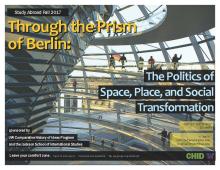Berlin, Germany
Berlin is a city with many faces: in the last century alone, it has been at the center of two World Wars, the site of the Cold War and the Wall, as well as the epicenter of unification and European integration of East and West. The Autumn 2017 CHID/European Studies program in Berlin will explore the city as a prism for German history, unification, and European integration 25 years after German unification. We will trace the social, cultural, political and architectural markers of a divided past and ask how they inform the present and future of this global city. What did political unification mean for the citizens of Berlin, and how have economic and social changes impacted post-Cold War German identities? What role does Germany play in the current European debt crisis and will its new power in international relations be welcomed in Europe? We will address these questions by way of urban explorations in the German capital, in meetings with public officials, social activists, artists, and journalists as well as through a wide variety of thematic texts and other media. The primary goal is to unsettle preconceived notions of East/West cultural, economic, and political power and to expose students to different modes of seeing the city.
Courses include two seminars and an independent research course, on-site visits and guided tours, as well as guest lectures. An optional four-week intensive language course will be offered in Berlin before the fall program begins (this option requires an additional fee). Students will be required to attend a 1-credit, non-graded orientation seminar in Spring 2017 (JSIS 194).
Berlin site visits include the German Parliament, the former STASI (secret police) headquarters, memorial sites for the Berlin Wall, the Topography of Terror, the Jewish museum, party headquarters, major art galleries, and other relevant sites in Berlin. We plan field trips to Munich and Prague.
Here are some student comments from previous Berlin Programs:
- “Berlin is the most amazing city I have ever been to, hands down – and I had done a good amount of traveling. The opportunity to learn from these particular professors in such an astounding location is awesome.”
- “Studying in Humboldt University campus was a really positive aspect of the trip. The living arrangements were really good. Big apartments.”
- “It was one of the best experiences I have had. You fall in love with Berlin as soon as you get there and you learn so much. Berlin has such a rich history and being able to experience it was amazing.”
In addition to the UW Study Abroad application materials, all applicants will be required to provide an unofficial transcript.
JSIS B 467/CHID 471 B – De/constructing the capital: Historical memory and the politics of space in Berlin (5 credits)
JSIS 488/JSIS B 365/CHID 498 – Urban Cultures and Social Change in Berlin (5 credits)
JSIS A 494/CHID 471A – Germany in Europe: Political Legacies and Post-Unification Challenges
*Note that the fees stated above do not include some additional costs, including, but not limited to: airfare, Study Abroad Insurance ($2/day), and personal spending money. Remember that these costs will differ by program. Be sure to read our Fees, Financing, and Withdrawal information for details about the fee structure and payment schedule.
